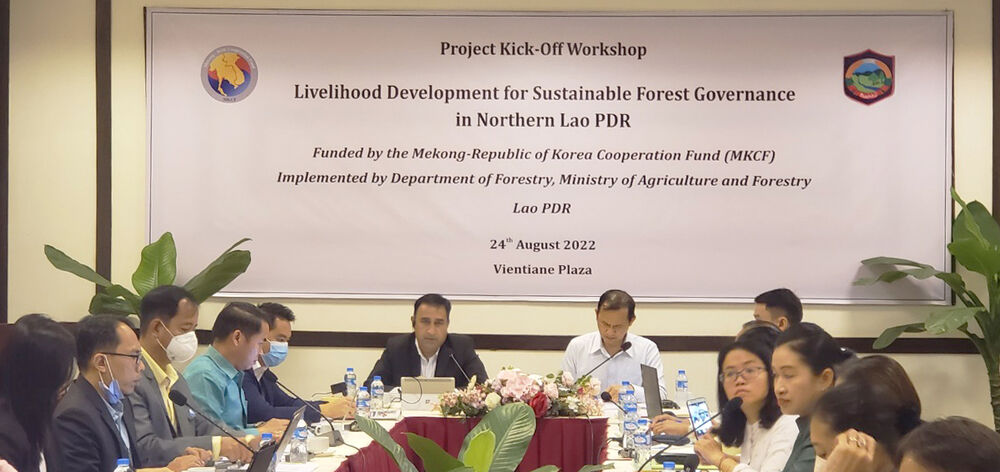In 1960 forest cover more than 70% of the total land area in Lao PDR and has decreased to 47% in 2015. The major drivers of deforestation in Lao PDR are include agricultural expansion either for commercial or for small holder. In addition, 80% of population rely on forest and non-timber forest products for their livelihood.
The country has ratified the Paris Agreement in September 2016 pledge to reduce its GHG emission as indicated in their Nationally Determined Contribution (last updated in 2021). In land use change and forestry sector, the country has set up the mitigation target to increase forest cover to 70% of land area by 2030 through several measures i.e. reduced emissions from deforestation and forest degradation, foster conservation, sustainable management of forests, buffer zones of national parks and other preserves, and enhancement of forest carbon stocks.
To support Lao PDR in achieving the 2030 target, Department of Forestry, Ministry of Agriculture and Forestry on 24 August 2022 launch a project on “Livelihood Development for Sustainable Forest Governance in Northern Laos”. The project is funded by Mekong-Republic of Korea Cooperation Fund (MKCF) through the fund management and coordination of the Mekong Institute (MI). The project is aimed to support the implementation related framework and activities of climate changes adaptation and mitigation; which involve the sustainable livelihood development in the highly vulnerable deforestation and forest degradation areas in the country.
The specific objectives and activities of the project include:
- Enabling environment for implementation of Reducing Emissions from Deforestation and Forest Degradation (REDD+) activities in Laos. This objective is to unlock of various obstacles for REDD+ implementation through revising and strengthening the legal and regulatory framework for forestry sector and improving enforcement of forestry regulatory framework.
- Livelihood improvement and mitigation agricultural drivers of deforestation. This objective will support enhancing good agricultural and agroforestry practices in the target project areas in two northern provinces namely Houaphan and Xayyaboury through the provision of technical assistances to agricultural extension staff at the provincial and district levels by applying a training-to-trainer approach (ToT), development of training materials on agribusiness development, livestock production, agricultural cultivation and agroforestry practices as well as initiative of agricultural production funding at village level for supporting good agricultural practices.
- Implementation of climate change mitigation activities. This will include the management of existing forest and restoration of forest (i.e. enrichment approaches) in the degraded areas in the village demarcated forest areas based on village land use planning territories. Sustainable forest management activities include: (1) development of village forest management regulation, (2) investment for forest restoration in identified degraded land, and (3) reeducate villagers for understanding the important of forest management for their future livelihoods
The event is opened by Mr. Khamsene Ounekham, the Deputy Director General of the Department of Forestry and is attended by the project team members, representative of several divisions under the department, staffs of provincial department of Houaphan and Xayyaboury, representative of Ministry of Foreign Affairs in charge of Mekong-Korea cooperation as well as representative from GIZ which implement a project on GFLL (Governance Forest Landscapes and Livelihood) in Lao PDR currently.
The MI team is led by Mr. Madhurjya K. Dutta, the MI MKCF Coordinator joined the event. Considering the MKCF project is a regional project in nature, Mr. Dutta in his welcoming remark emphasize the importance of the project to include Republic of Korea and other Mekong countries as the project beneficiaries in form of knowledge exchange either as resource persons/experts or as the capacity building activities participants. To introduce the project implementing team with the project’s requirements, Mr. Robby Rosandi of the MKCF MI team presented the MKCF project monitoring and reporting guidelines.








